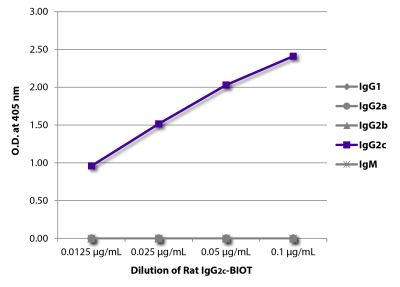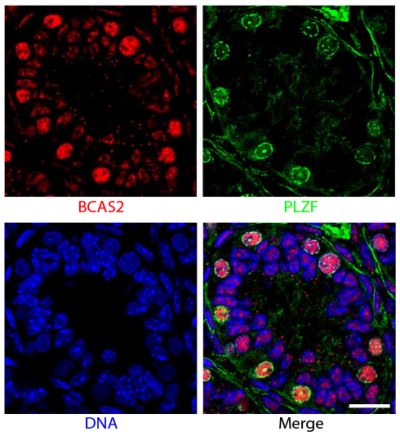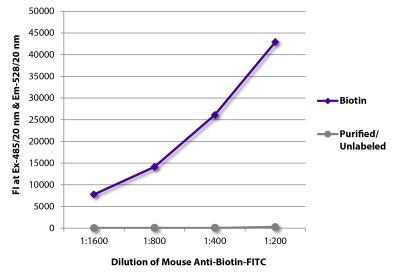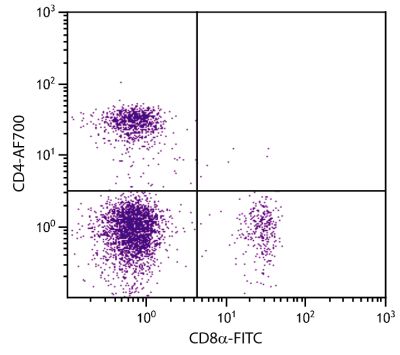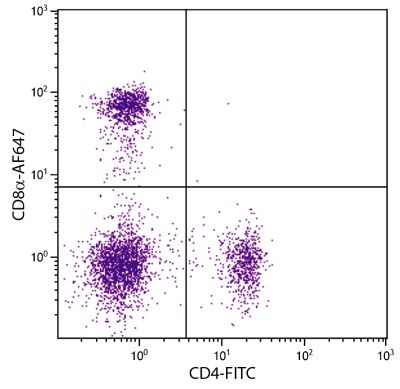Rat Anti-Mouse CD90-BIOT (G7)
Cat. No.:
1740-08
Biotin Anti-Mouse CD90 antibody for use in flow cytometry, immunohistochemistry, and immunoprecipitation assays.
$284.00
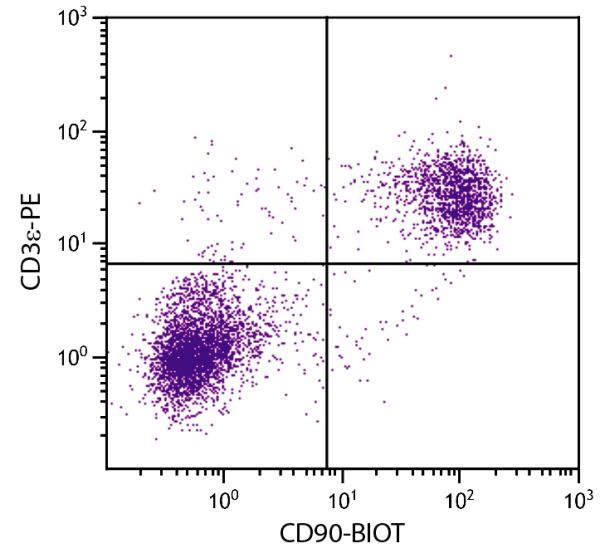

| Clone | G7 |
|---|---|
| Isotype | Rat (Lewis) IgG2cκ |
| Isotype Control | Rat IgG2c-BIOT (SB68b) |
| Specificity | Mouse CD90 (Thy-1.1 and Thy1.2 alloantigens/CD90.1 and CD90.2) |
| Alternative Names | Thy-1 |
| Description | CD90 (Thy-1), a GPI-anchored molecule and one of the smallest members of the immunoglobulin superfamily of cell surface receptors, consists of a single V-set domain. It is expressed on thymocytes, peripheral T lymphocytes, some intraepithelial T lymphocytes, and neurons of all mouse strains. The monoclonal antibody G7 stimulates T-cell proliferation and IL-2 secretion via signaling through the T-cell receptor/CD3 complex. G7 has also been reported to promote apoptosis of thymocytes and CTL clones and to mediate adhesion of thymocytes to thymic stroma. |
| Immunogen | Mouse T cell hybridoma C6/G8 |
| Conjugate | BIOT (Biotin) |
| Buffer Formulation | Phosphate buffered saline containing < 0.1% sodium azide |
| Clonality | Monoclonal |
| Concentration | 0.5 mg/mL |
| Volume | 1.0 mL |
| Recommended Storage | 2-8°C |
| Applications |
Flow Cytometry – Quality tested 1,6-8 Immunohistochemistry-Paraffin Sections – Reported in literature 4 Immunoprecipitation – Reported in literature 1 Stimulation – Reported in literature 1 Activation – Reported in literature 1,5 Apoptosis – Reported in literature 2,3 |
| RRID Number | AB_2795226 |
| Gene ID |
21838 (Mouse) |
| Gene ID Symbol |
Thy1 (Mouse) |
| Gene ID Aliases | T25; CD90; Thy-1; Thy1.1; Thy1.2; Thy-1.2 |
| UniProt ID |
P01831 (Mouse |
| UniProt Name |
THY1_MOUSE (Mouse) |
Documentation
Certificate of Analysis Lookup
Enter the Catalog Number and Lot Number for the Certificate of Analysis you wish to view
- 1. Gunter KC, Malek TR, Shevach EM. T cell-activating properties of an anti-Thy-1 monoclonal antibody. Possible analogy to OKT3/Leu-4. J Exp Med. 1984;159:716-30. (Immunogen, FC, IP, Stim, Activ)
- 2. Ucker DS, Meyers J, Obermiller PS. Activation-driven T cell death. II. Quantitative differences alone distinguish stimuli triggering nontransformed T cell proliferation or death. J Immunol. 1992;149:1583-92. (Apop)
- 3. Hueber A, Raposo G, Pierres M, He H. Thy-1 triggers mouse thymocyte apoptosis through a bcl-2-resistant mechanism. J Exp Med. 1994;179:785-96. (Apop)
- 4. Whiteland JL, Nicholls SM, Shimeld C, Easty DL, Williams NA, Hill TJ. Immunohistochemical detection of T-cell subsets and other leukocytes in paraffin-embedded rat and mouse tissues with monoclonal antibodies. J Histochem Cytochem. 1995;43:313-20. (IHC-PS)
- 5. Kojima H, Toda M, Sitkovsky MV. Comparison of Fas- versus perforin-mediated pathways of cytotoxicity in TCR- and Thy-1-activated murine T cells. Int Immunol. 2000;12:365-74. (Activ)
- 6. Kucic T, Copland IB, Cuerquis J, Coutu DL, Chalifour LE, Gagnon RF, et al. Mesenchymal stromal cells genetically engineered to overexpress IGF-I enhance cell-based gene therapy of renal failure-induced anemia. Am J Physiol Renal Physiol. 2008;295:F488-96. (FC)
- 7. Eliopoulos N, Stagg J, Lejeune L, Pommey S, Galipeau J. Allogeneic marrow stromal cells are immune rejected by MHC class I- and class II-mismatched recipient mice. Blood. 2005;106:4057-65. (FC)
- 8. Xiao J, Angsana J, Wen J, Smith SV, Park PW, Ford ML, et al. Syndecan-1 displays a protective role in aortic aneurysm formation by modulating T cell-mediated responses. Arterioscler Thromb Vasc Biol. 2012;32:386-96. (FC)
See All References


